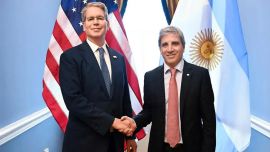Venezuela hopes to produce two million doses per month of a Cuban coronavirus vaccine, President Nicolás Maduro said Sunday.
The South American country will also take part in Phase 3 trials for the Abdala vaccine produced by its socialist ally.
"We've signed an agreement to produce in our laboratories... two million vaccines a month of the Abdala vaccine... for August, September, approximately," said Maduro in a television address.
Earlier in the week, the government claimed that it would have already purchased the 30 million vaccines it needs but for economic sanctions, led by the United States.
That brought a rebuke from opposition leader Juan Guaidó, who accused the government of lying and blamed Maduro for Venezuela's lack of vaccines.
Cuba has developed four vaccines that are in various stages of clinical trials.
The island nation has already started vaccinating its healthcare workers with its two vaccines still in the third phase of clinical trials.
One of those is Abdala, which is being given to 124,000 healthcare workers, while 48,000 volunteers are taking part in a parallel Phase III clinical study.
Should it be approved, Abdala would be the first Covid-19 vaccine entirely developed and produced in Latin America.
Venezuela's vaccine rollout has been slow, with the country receiving just 250,000 Russian Sputnik V vaccine doses and half a million from China's Sinopharm to date.
Maduro said his government would also sign deals to produce vaccines "with Russia, with China and with other countries."
The government said it had paid just over half of the amount it needs to acquire 11.3 million doses through the World Health Organisation's Covax mechanism.
Officially, the country of 30 million has had 175,000 cases and some 1,700 deaths, but observer groups such as Human Rights Watch question the numbers, which they say are likely vastly underestimated.
— TIMES/AFP



















Comments